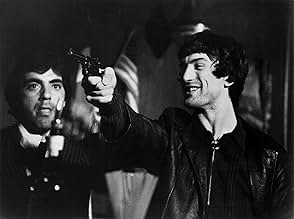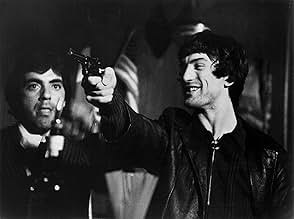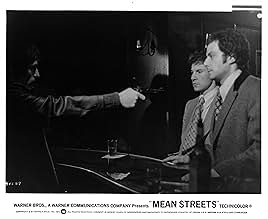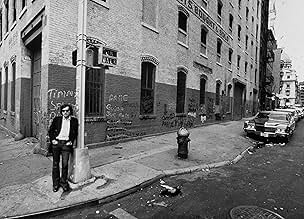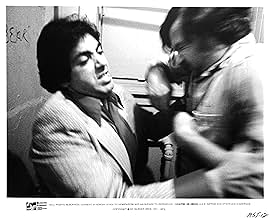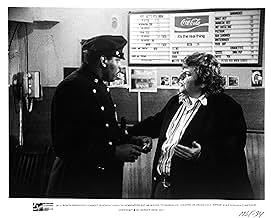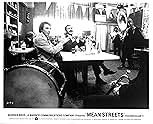Un petit truand aspire à gravir les échelons de la mafia locale.Un petit truand aspire à gravir les échelons de la mafia locale.Un petit truand aspire à gravir les échelons de la mafia locale.
- Prix
- 5 victoires et 5 nominations au total
Victor Argo
- Mario
- (as Vic Argo, Victor Argo)
Murray Moston
- Oscar
- (as Murray Mosten)
What Scorsese Film Ranks Highest on IMDb?
What Scorsese Film Ranks Highest on IMDb?
Cinema legend Martin Scorsese has directed some of the most acclaimed films of all time. See how IMDb users rank all of his feature films as director.
Histoire
Le saviez-vous
- AnecdotesFrancis Ford Coppola contributed money to the budget of the film. However, it is rumored that he lent Martin Scorsese $3000 as the Mafia shook him down for using the San Genaro Festival as a backdrop without "permission". It's generally presumed he Mafia uses the all-cash festival to launder money from their ill-gotten gains.
- GaffesThe end credits on the DVD incorrectly list David Carradine as "Oscar" and Robert Carradine as "Drunk".
The end credits in the movie are correct. Per IMDb Guidelines, errors in a DVD have nothing to do with the filmmakers; as such, they are not acceptable as goofs.
- Citations
[first lines]
Voice in Charlie's Mind: You don't make up for your sins in church. You do it in the streets. You do it at home. The rest is bullshit, and you know it.
- Autres versionsNBC edited 10 minutes from this film for its 1977 network television premiere.
- ConnexionsEdited into American Cinema: Film Noir (1995)
- Bandes originalesJumpin' Jack Flash
Written by Mick Jagger (as M. Jagger), Keith Richards (as K. Richards) (uncredited)
By The Rolling Stones
Courtesy of ABKCO Records
Commentaire en vedette
Mean Streets
Directed by Martin Scorsese (1973)
Mean Streets came out in 1973 after Scorsese almost had the script under development in a decade. This is one of his first personal movies, describing the raw environment in the streets of Little Italy in NYC. We follow Charlie in the leading role and the bunch of guys around him. The hustler Johnny Boy owes a lot of money to the loan shark Tony and doesn't make his payments to him. Charlie now tries to work out a deal with Tony and is trying to get Johnny Boy to pull himself together, even though this looks like an impossible mission.
Scorsese's first motion picture Who's That Knocking at My Door and Mean Streets have many resemblances and contain the typical trademarks that Scorsese is now well known for. He almost always makes a character study of the life of lonely men, who are trying to get the best out of their situation in the asphalt jungle. Hustling, working, drinking, taking drugs etc. are very typical things to do for the persons appearing in his movies.
Mean Streets is photographed mostly with a hand hold camera, which helps create a raw look that fits pretty good to this environment. Also the movie doesn't contain an actual score. Actually songs from the director's personal music collection do work as the background music. The plot is this picture is only secondary. This is like many of Scorsese's other movie primarily a character driven story with a raw environment description.
The movie marks the start of one of the greatest director/actor collaborations ever! The role of Johnny Boy was Robert De Niro's role in a Scorsese picture, and later on he went to bigger leading roles under the director, which gave them both the reputation that they have today. Also this is Harvey Keitel's second leading role in a Scorsese picture, but after this movie Keitel and De Niro kind switched roles (see Taxi Driver).
This movie is not just a good movie - It also is the movie which helped form the foundation of Martin Scorsese's later pictures.
8/10
- "I f*uck you right where you breathe"
Directed by Martin Scorsese (1973)
Mean Streets came out in 1973 after Scorsese almost had the script under development in a decade. This is one of his first personal movies, describing the raw environment in the streets of Little Italy in NYC. We follow Charlie in the leading role and the bunch of guys around him. The hustler Johnny Boy owes a lot of money to the loan shark Tony and doesn't make his payments to him. Charlie now tries to work out a deal with Tony and is trying to get Johnny Boy to pull himself together, even though this looks like an impossible mission.
Scorsese's first motion picture Who's That Knocking at My Door and Mean Streets have many resemblances and contain the typical trademarks that Scorsese is now well known for. He almost always makes a character study of the life of lonely men, who are trying to get the best out of their situation in the asphalt jungle. Hustling, working, drinking, taking drugs etc. are very typical things to do for the persons appearing in his movies.
Mean Streets is photographed mostly with a hand hold camera, which helps create a raw look that fits pretty good to this environment. Also the movie doesn't contain an actual score. Actually songs from the director's personal music collection do work as the background music. The plot is this picture is only secondary. This is like many of Scorsese's other movie primarily a character driven story with a raw environment description.
The movie marks the start of one of the greatest director/actor collaborations ever! The role of Johnny Boy was Robert De Niro's role in a Scorsese picture, and later on he went to bigger leading roles under the director, which gave them both the reputation that they have today. Also this is Harvey Keitel's second leading role in a Scorsese picture, but after this movie Keitel and De Niro kind switched roles (see Taxi Driver).
This movie is not just a good movie - It also is the movie which helped form the foundation of Martin Scorsese's later pictures.
8/10
- Malte006
- 20 oct. 2005
- Lien permanent
Meilleurs choix
Connectez-vous pour évaluer et surveiller les recommandations personnalisées
Détails
- Date de sortie
- Pays d’origine
- Site officiel
- Langues
- Aussi connu sous le nom de
- Mean Streets
- Lieux de tournage
- sociétés de production
- Consultez plus de crédits d'entreprise sur IMDbPro
Box-office
- Budget
- 500 000 $ US (estimation)
- Brut – États-Unis et Canada
- 32 645 $ US
- Fin de semaine d'ouverture – États-Unis et Canada
- 32 645 $ US
- 15 mars 1998
- Brut – à l'échelle mondiale
- 61 676 $ US
- Durée1 heure 52 minutes
- Couleur
- Rapport de forme
- 1.85 : 1
Contribuer à cette page
Suggérer une modification ou ajouter du contenu manquant

Lacune principale
What was the official certification given to Les rues chaudes (1973) in Japan?
Répondre




